US election: 10 US election oddities
- Published
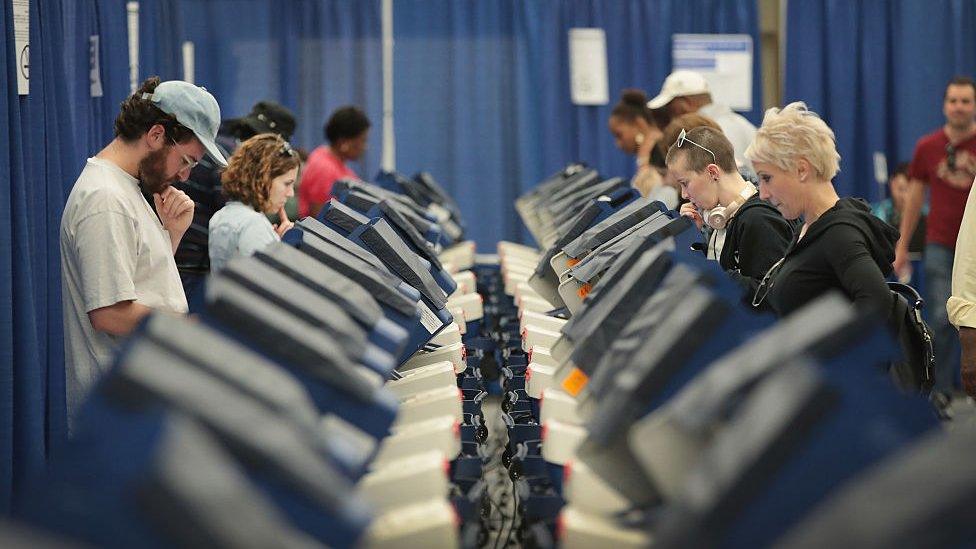
Some US states uphold antiquated policies such as prohibiting officials from participating in duels
Americans are bracing for the end of an unusual election year. And the process has shone a light on some strange laws and customs.
In some states, voters have long dealt with election quirks that have been on the books for decades.
And then there are unusual customs that have only recently evolved, but have become as much a part of the election as campaign adverts.
We examine 10 of the lesser-spotted things about American presidential politics - and about this campaign.

No alcohol sales on election day
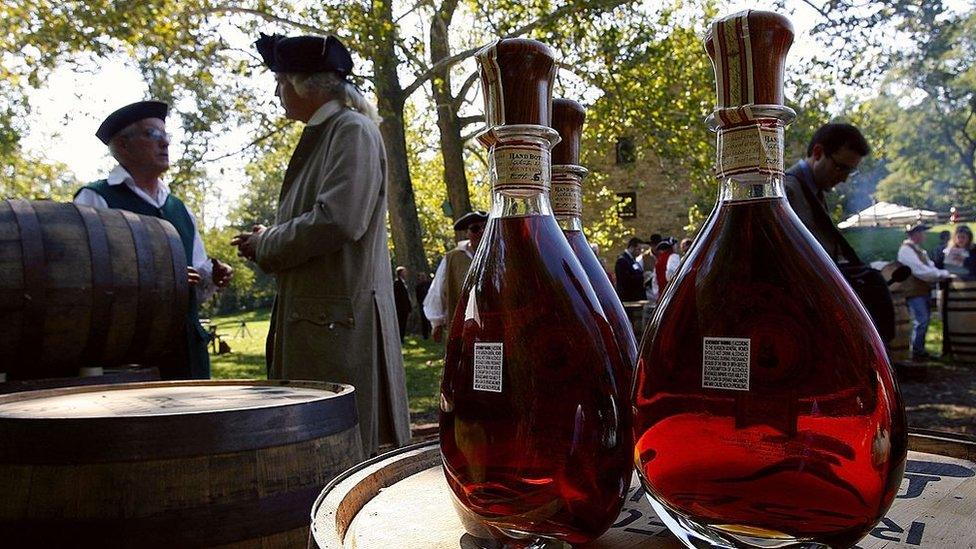
Mr Washington's distillery was reconstructed in Mount Vernon, Virginia, in 2007
While there are no longer any statewide laws barring the sale of alcohol on election day, some local cities and counties continue the practice in states such as Indiana. In fact, 18 cities and seven counties in the Hoosier State have local ordinances banning the sale of alcohol on 8 November.
The practice would be considered un-American by George Washington's standards. While running for the House of Burgesses in 1758, the founding father famously spent his entire campaign budget of £50 on alcohol, plying voters with 160 gallons of liquor to drive turnout and win favour.
President Washington opened a major whiskey distillery at his estate in Mount Vernon, Virginia, in 1797. By the time of his death in 1799, his distillery was one of the largest in the country.

No agnostics allowed in office
The US maintains the separation of church and state, but some states have attempted to circumvent the law by requiring candidates to at least believe in God.
Texas bans religious tests as a qualification to hold office, but requires an official to "acknowledge the existence of a Supreme Being", according to its Constitution's Article-I Bill of Rights, external.
Tennessee also upholds a similar law, banning any person who denies a supreme being from holding office in the state's civil department. Other states with similar laws include South Carolina, North Carolina, Mississippi, Maryland and Arkansas.

Voting stickers
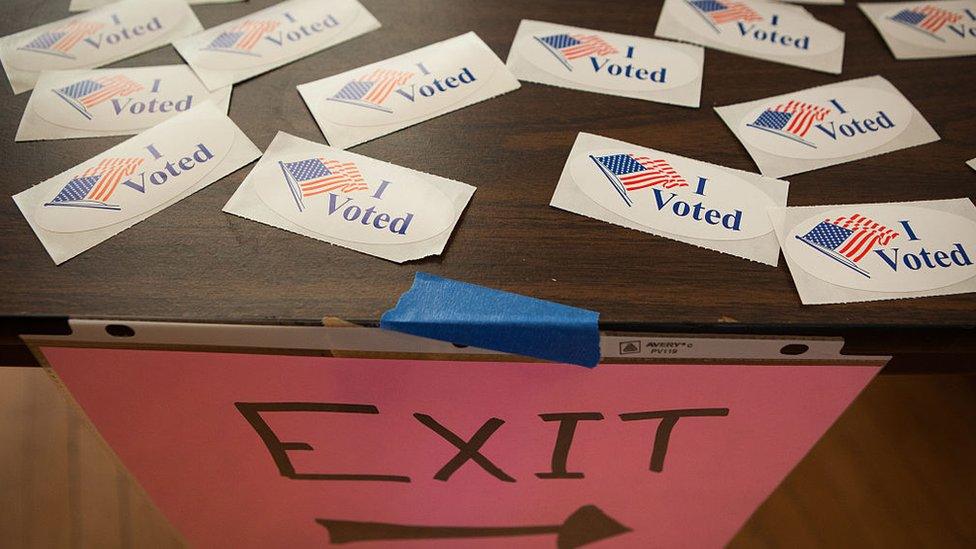
Many US states design their own stickers to hand out after voters cast a ballot
It is unclear when handing out stickers became a national trend, but US voters are often seen bearing emblems with the words: "I voted" upon leaving a polling station.
But Florida-based company, National Campaign Supply, claims to have designed the "original" sticker now used across the country. The company first began printing the "I voted" sticker nationwide in 1986.
Some US states and local counties even design their own voting sticker. Georgia voters receive stickers shaped like a peach, referring to the state's moniker and official fruit. Meanwhile, cities like Chicago have eliminated the stickers completely, citing government costs.
Researchers have suggested the strange sticker tradition may play a psychological part in driving voter turnout. A recent study found, external that many voters cast a ballot so they can tell others they did.

Time limits in voting booth
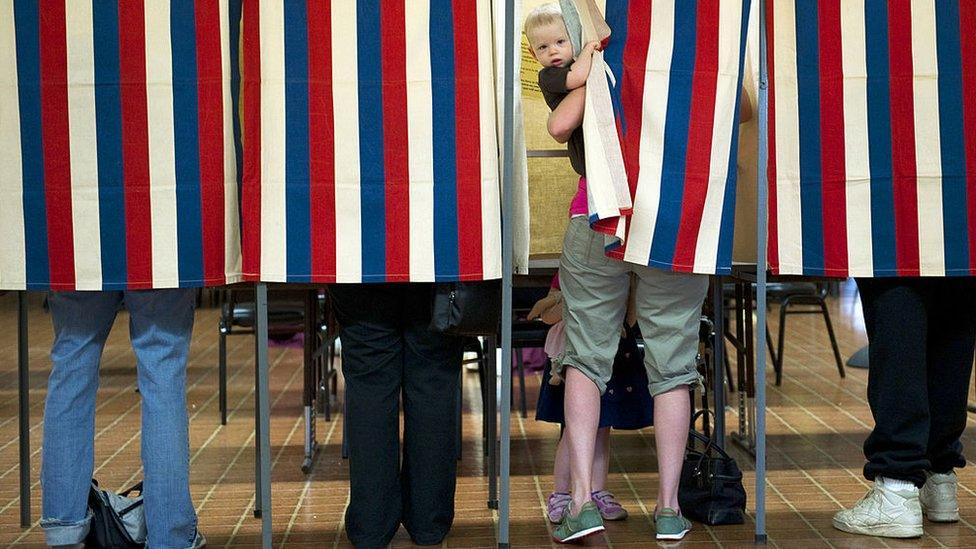
Indiana and Alabama allow voters only a matter of minutes in the voting booth
Indiana allows voters just three minutes in the voting booth during primary elections and only two minutes during general and municipal elections. But forcing a voter from the booth would require a member of the election precinct board, or poll workers, to remove that person, according to Angela Nussmeyer, a co-director for the Indiana Election Division. According Ms Nussmeyer, the law is not enforced.
Alabama's state code gives voters four minutes to vote before a polling worker may ask them if they need assistance, according to state election code. If they do require help, the voter is allowed at least an additional five minutes to vote. But if a voter does not need assistance, he or she will be given one additional minute. If no one is waiting in line, voters receive as much time as necessary to finish voting.
How did we end up with two such unpopular candidates?

'Idiots' banned from casting a ballot
Kentucky's constitution prohibits "idiots and insane persons" from casting a ballot, but a person must be ruled incompetent and unable to vote by a judge.
In fact, the term "idiots" and "insane persons" were common phrases used in state constitutions in Ohio, New Mexico and Mississippi, but were meant to refer to people with mental disabilities.
Ohio's constitution states under Article V, external: "No idiot, or insane persons, shall be entitled to the privileges of an elector".
However, a probate court must declare a person incompetent for voting purposes in Ohio.
Similar language bars "idiots" from voting in Mississippi, but individuals are purged from voter rolls if they are adjudicated by a court of law as incompetent, according to Leah Rupp Smith, assistant secretary of state of communications for Mississippi.
But according to federal law, a person cannot be barred from voting due to "incompetence" except in very limited circumstances. Individuals with mental disabilities are entitled to vote even if under guardianship or receiving assisted care, according to the National Alliance on Mental Illness.
People with disabilities also have the right to receive help with voting from friends, family members or care givers.

Voting multiple times
At least seven states explicitly allow voters to change their ballot if they have voted before election day. With as much as 40% of eligible voters casting their ballots early this year, the law has gained some attention on the campaign trail. Republican nominee Donald Trump has appealed to voters in Wisconsin, asking them to vote again if they're feeling "buyer's remorse" over voting for his rival Hillary Clinton.
Wisconsin allows voters to change their minds up to three times before the vote becomes official on election day - but only one vote counts. Oshkosh City Clerk Pam Ubrig told ABC News that the process can be very time-consuming. Other states include Minnesota, Pennsylvania, New York, Connecticut and Mississippi.

Political puppies
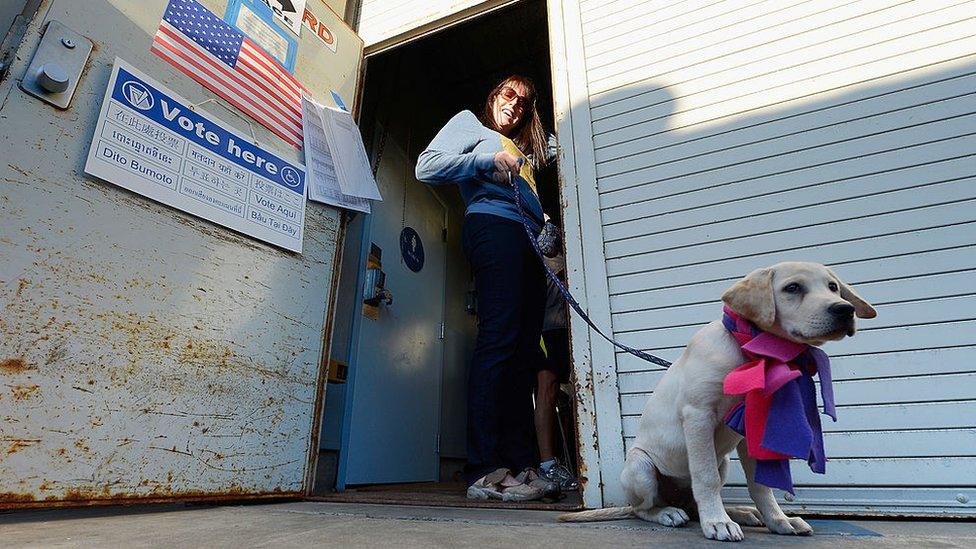
A political group is deploying puppies to polling stations in five states to drive voter turnout
NextGen Climate, a climate-changed focused political group, is planning to bring puppies to polling stations in Iowa, North Carolina, Pennsylvania, Nevada and New Hampshire to try to entice young voters to turn out.
The group came up with the idea when it noticed anecdotally that rates of voter registration and commitments to vote were higher at locations where staff and volunteers brought puppies compared with poll stations without canine companions, Business Insider reported, external.
NextGen, which targets the elusive millennial voting bloc, has used popular mobile apps like Pokemon Go and Tinder to try and reach voters on their phones.

Duels prohibited
It may sound a bit antiquated to challenge someone to a duel, but anyone who does is not allowed to hold office in Tennessee. Officials will be punished and could have their title revoked if they fight or take part in a duel.

Space age voting
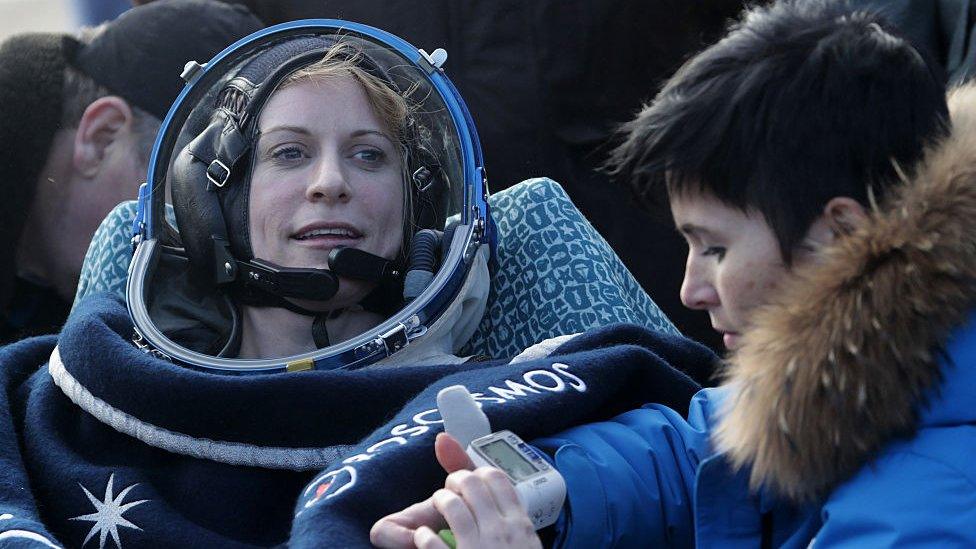
US astronaut Kate Rubins sent in her vote from the International Space Station before she landed on 30 October
A 1997 Texas bill passed by state legislators and signed by then-Governor George W Bush created a technical procedure that allowed astronauts to vote from space.
Astronauts receive the ballot through an email secured with crew member-specific credentials, according to Nasa. The ballot is uplinked by Nasa's Johnson Space Center Mission Control Center and once completed, sent to the County Clerk's Office by email to be recorded.
Astronaut Kate Rubins, who returned to Earth on 30 October, cast her ballot from space, while Shane Kimbrough intends to vote from the International Space Station.

Choose your inauguration Bible
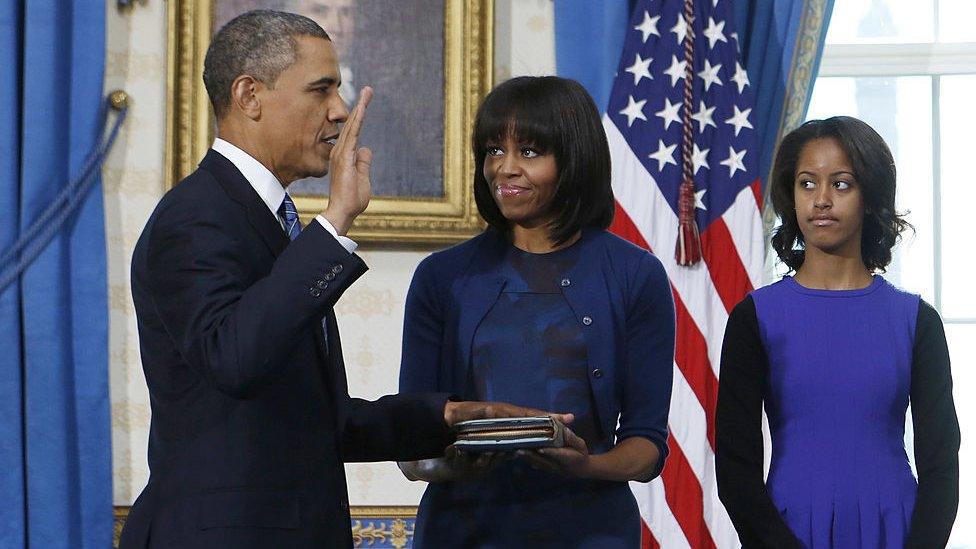
Mr Obama was sworn in using a Bible used by Abraham Lincoln and another from the family of Martin Luther King Jr in 2013
Though the US Constitution does not require a president to take the oath of office using a Bible, George Washington began the tradition when he used his Masonic Bible for his inauguration.
John Quincy Adams used a US law book in 1825 while Theodore Roosevelt selected no book at all in his first inauguration in 1902.
But other US presidents have chosen to be sworn in using symbolic Bibles, often selecting a specific verses or passage to mark the inauguration.
Franklin Roosevelt used the Bible verse for all four of his inaugurations: "Though I speak with the tongues of men and of angels, and have not charity, I am become as sounding brass, or a tinkling cymbal" (Corinthians).
President Barack Obama took the oath of office for his second term with Abraham Lincoln's Bible, to mark the 150th anniversary of Lincoln's Emancipation Proclamation, and Martin Luther King Jr's "travelling" Bible, to commemorate the 50th anniversary of the March on Washington.

What you need to know about US election
Election 2016: The race for battleground states